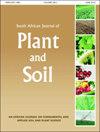调整南非各学科之间的保护农业
IF 0.7
Q3 AGRONOMY
引用次数: 5
摘要
在南非,保护性农业(CA)一词经常被用来描述任何土壤保持行动,而不是CA所包含的三个管理原则的组合,即最小土壤干扰,使用多种作物轮作或联合种植,以及用有机土壤覆盖保护土壤。2019年1月,来自高等院校、研究机构、政府和私营公司的代表举办了一个研讨会,分享和交流CA研究的经验和教训,并确定南非CA领域的研究差距。通过整理来自研讨会的信息,本文旨在将CA方法与南非不同学科的CA方法结合起来,并确定南非CA不可避免的挑战和对CA的(错误)看法。很明显,CA适用于大多数农业系统,但具体情况不同。不能推荐任何特定的CA实践作为解决所有系统中遇到的问题的灵丹妙药。在南非不同的农业系统中适应和应用CA需要以明智和现实的方式处理,以实际而不是纯粹的理论考虑为基础。重要的是,在不考虑可持续集约化的情况下,不能提倡CA。合理地处理CA需要多学科的方法。本文章由计算机程序翻译,如有差异,请以英文原文为准。
Aligning Conservation Agriculture among various disciplines in South Africa
In South Africa, the term Conservation Agriculture (CA) is often used to describe any soil conservation action rather than a combination of the three management principles that CA encompasses, namely minimum soil disturbance, using a diversity of crops in rotation or association, and protecting the soil with an organic soil cover. A workshop was held with delegates from tertiary institutions, research institutions, government and private companies, in January 2019, to share and exchange CA research experiences and lessons, and to identify research gaps in the field of CA in South Africa. By collating the information from the workshop, this article aims to align CA approaches among various disciplines in South Africa and to identify the inevitable challenges with CA and (mis-)perceptions of CA in South Africa. It was clear that CA is applicable to most farming systems, but is context specific. No specific CA practice can be recommended as a panacea to solve issues experienced in all systems. Adaptation and application of CA within different South African farming systems needs to be dealt with sensibly and realistically, in ways that are based on practical rather than purely theoretical considerations. It is important that CA is not advocated without taking sustainable intensification into account. Dealing with CA sensibly requires a multidisciplinary approach.
求助全文
通过发布文献求助,成功后即可免费获取论文全文。
去求助
来源期刊

South African Journal of Plant and Soil
Agricultural and Biological Sciences-Plant Science
CiteScore
1.90
自引率
11.10%
发文量
32
期刊介绍:
The Journal has a proud history of publishing quality papers in the fields of applied plant and soil sciences and has, since its inception, recorded a vast body of scientific information with particular reference to South Africa.
 求助内容:
求助内容: 应助结果提醒方式:
应助结果提醒方式:


